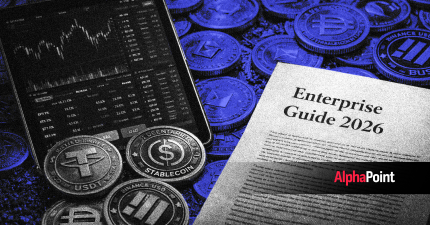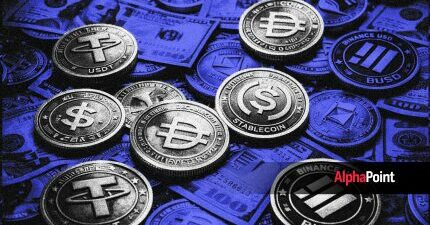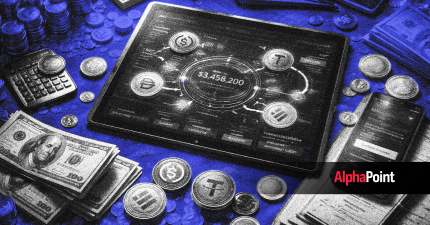The Rise of Tokenized Money Market Funds
Asset tokenization is rapidly growing. The ability to convert real-world assets into digital assets on a blockchain has unlocked new liquidity opportunities, making the innovation compelling for investors.
Money market funds (MMF) are among the latest to benefit from tokenization. Asset managers like Franklin Templeton have made significant strides toward making the innovation more accessible, allowing peer-to-peer token transfers for its $380 million tokenized MMF.
Are tokenized MMFs the future? In this post, we review their rise and explore their potential to transform the digital investment landscape.
What Are Money Market Funds?
Money market funds, or liquidity funds, are mutual funds that invest in short-term assets like government-issued bonds. They’re sponsored by investment management companies and are favored by risk-averse investors for their stability.
Typically, investors turn to these mutual funds when seeking a lower-risk alternative to the stock market, as they are generally more liquid. In the financial markets, MMFs are often classified as “Cash and Cash Equivalents” and are preferred by institutional investors for their reliability and liquidity.
They’re also attractive for storing money while earning better interest rates than savings accounts, giving investors an edge in preserving capital and maintaining flexibility within their portfolios.
Understanding Tokenized Money Market Funds
Tokenized money market funds offer a new digital investment vehicle, giving investors an innovative way to access the benefits of MMFs with the added agility of blockchain technology. These digital tokens represent shares in a fund, allowing investors to explore the digital asset space without leaving behind the familiar advantages of traditional MMFs.
They retain the low-risk benefits but introduce unique advantages. Investors can buy fractions of shares, trade around the clock, and seamlessly track transactions — all thanks to blockchain.
Key Elements of Tokenized Money Market Funds
Tokenized MMFs come with innovative features that distinguish them from traditional funds, including:
Digital Tokenization
These assets are created through token issuance, a process that converts traditional fund shares into digital tokens. These tokens represent ownership and can be traded on blockchain platforms, allowing for faster, more efficient transactions.
The added functionality of blockchain technology provides greater flexibility and transparency, making portfolio management more seamless and accessible for investors.
Blockchain Technology
Blockchain technology is the backbone of tokenized MMF issuance and management.
Unlike traditional financial systems, where transactions can be modified or deleted, blockchain records are permanent and unchangeable. This creates a higher level of transparency, security, and efficiency, ensuring that all transactions are verifiable and protected from tampering.
Accessibility
Operating in blockchain-based markets, tokenized funds can be traded 24/7 without being restricted by typical trading hours or jurisdiction limitations. This around-the-clock access boosts liquidity and makes it easier for a broader range of investors to get involved, no matter where they are.
Fractional Ownership
Tokenized funds enable fractional ownership, allowing investors to buy smaller portions of shares. This lowers the entry barrier for small investors and gives individuals and institutions the flexibility to spread risk across different funds.
These assets aren’t limited to financial products; they can also include real estate, allowing investors to buy fractional ownership in properties through digital tokens.
Why Are Tokenized Money Market Funds Gaining Traction?
Investors are increasingly looking for ways to gain control over their investments and reduce operational costs, which is driving the rise of decentralized finance (DeFi). With DeFi expected to reach $48.02 billion by 2031, tokenized MMFs are growing in popularity.
They are also gaining attention because they show promise of higher yields than stablecoins. Traditionally, investors have opted for coins like USDT and USDC in the volatile digital asset space to mitigate their risk in crypto portfolios.
However, stablecoins have a significant limitation — they offer minimal returns, especially during inflationary periods. Tokenized MMFs offer an appealing solution, allowing both new and experienced investors to maximize returns while minimizing risk in their portfolios.
Benefits of Tokenized Money Market Funds
Tokenized money market funds are a smart option for enhancing traditional investment products. Key benefits include:
Increased Accessibility, Security, and Transparency
Tokenized MMFs are more accessible because they can be traded 24/7 on tokenized asset platforms. They also allow investors to buy fractions of MMF shares, which can attract those with limited capital or anyone cautious about making large investments.
Further, these tokens are more secure and transparent than traditional assets because all transactions are recorded on a blockchain. The unalterable nature of blockchain technology limits the risk of theft, which can increase investor confidence.
Protects Against Major Cryptocurrency Price Volatility
Tokenized MMFs offer a more stable alternative to major cryptocurrencies like Bitcoin (BTC) and Ethereum (ETH), which are known for their extreme price volatility. By being linked to real-world assets, such as bonds and treasury notes, tokenized MMFs provide a safer, more predictable option.
This makes them especially appealing to investors seeking exposure to digital assets without the risks associated with speculative cryptocurrencies. Additionally, tokenized MMFs can still offer competitive returns, making them a compelling choice for portfolio diversification.
Reduction of Counterparty Risk
Counterparty risk—the chance that one party won’t fulfill its obligations—remains a significant concern in traditional markets. Tokenized MMFs reduce this risk by tying digital tokens to real-world assets, which are managed by trusted institutions like JPMorgan and Franklin Templeton.
This link ensures that tokens are backed by tangible assets, giving investors more confidence in their security. Additionally, blockchain’s transparent ledger further minimizes the chance of disputes, as all transactions are publicly recorded and verified, reducing the possibility of defaults or fraud.
Faster and Cheaper Transactions
Blockchain technology significantly speeds up transactions by enabling peer-to-peer transfers and automating processes through smart contracts. Without the need for traditional intermediaries like custodians, transactions are completed more quickly and at lower costs.
This increased efficiency makes tokenized MMFs more attractive to investors who want to minimize delays and expenses. Additionally, the reduced reliance on intermediaries can lead to improved liquidity and higher returns, as more of the investment goes directly into the assets rather than administrative fees.
The Future of Tokenized Money Market Funds
Tokenized money market funds show great potential for wider institutional adoption, offering greater accessibility to capital markets, speed, and transparency compared to traditional asset classes.
However, regulatory uncertainty and the complexity of digital assets pose challenges. Clearer guidelines on classification, governance, and taxation are essential to build investor confidence.
Further, as a technology-based fund, tokenized MMFs can be challenging for non-tech-savvy investors to access. To bridge this gap, financial institutions should focus on developing user-friendly interfaces and providing education on blockchain technology and digital wallets.
Overall, the future looks bright as more individuals and institutions embrace digital innovation.
Explore Asset Digitization With Alphapoint
Tokenizing money market funds is an excellent move for issuers and service providers, as it can increase investor interest in the digital asset market by offering higher returns and liquidity than traditional funds. They offer more stability than cryptocurrencies, making them an appealing option for risk-averse investors.
AlphaPoint makes this process seamless, providing white-label exchange technology for quick token issuance and smart contract deployment so you can bypass years of development.
Request a demo today to see how AlphaPoint simplifies your asset digitization!


